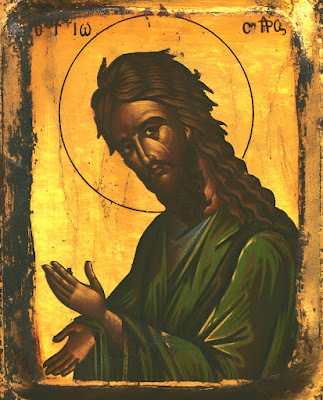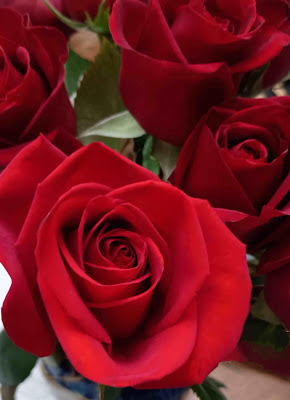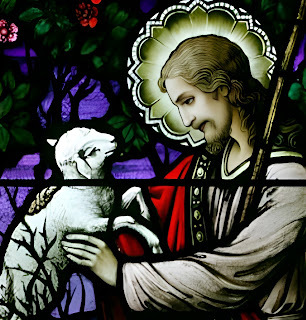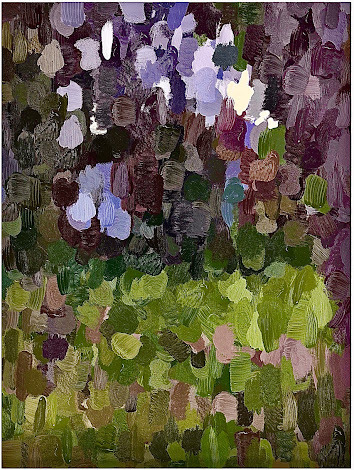John Janaro's Blog, page 7
June 26, 2025
Luigi Giussani: The Mystery Draws Close To Us

Luigi Giussani emphasizes that the Mystery which is the Source of everything, in revealing Himself as "Father," shows Himself to be our intimate companion.
"Even if it is translated into human terms, the result of revelation must be the intensifying of mystery as mystery. It must not reduce mystery, like a human being saying, 'I understand!'but rather deepen it. In this way, it is understood and yet always more understood as mystery.
"For example: the world and my own life depend on God. And this is true. But if we replace the enigmatic word 'mystery' that reality suggests, with the word, 'Father' that revelation implies, then we have an extremely comprehensible term, which is part of our experience: it is Father who gives me life, who has introduced me to the beauty of things, who has put me on my guard against possible dangers. Voilà: the Absolute, the Mystery, is Father, to repeat, 'tam pater nemo.' No one is such a Father. This truth that Christ has revealed does not diminish the Absolute. Rather, it deepens our knowledge of the mystery: Our Father who art at the depths, who art in heaven, Our Father who art in my profound roots, Thou who art now making me in this instant, who generate my path and guide me to my destiny!
"You can no longer retract after hearing these words of God. You can no longer go back. But, at the same time, the mystery remains, remains more profound: God is father, but he is father like no other is father. The revealed term carries the mystery further within you, closer to your flesh and bones, and you really feel it in a familiar way, as a son or daughter. There is no one who respects the sense of truth and is as devoted to his father as when the father is truly an intimate companion."
~Luigi Giussani, The Religious Sense, chapter 15.
June 24, 2025
The Birth of Saint John the Baptist
 Happy Feast of the Birth of Saint John the Baptist!
Happy Feast of the Birth of Saint John the Baptist! Today is my "name day" (along with many other more important things). We sometimes feel so "familiar" with the gospel accounts of John the Baptist that we can forget the singular role he plays in the history of salvation. He is the prophet heralding the coming of the Messiah - in history, in the Sacred Scriptures, and in the "rhythm" of liturgical life.
"There was a man sent from God, whose name was John. He came as a witness to testify to the light, so that all might believe through him. He himself was not the light, but he came to testify to the light. The true light, which enlightens everyone, was coming into the world" (John 1:6-9).
Here is an excerpt from the Preface to the Eucharistic Prayer in the Roman Rite, which sums up his ministry from his joyful testimony in his mother's womb to his birth, his prophetic testimony, his place in the "theophany" of Christ's baptism in the Jordan, and his martyrdom:
"In his Precursor, Saint John the Baptist,we praise your great glory,for you consecrated him for a singular honoramong those born of women.His birth brought great rejoicing;even in the womb he leapt for joyat the coming of human salvation.He alone of all the prophetspointed out the Lamb of redemption.And to make holy the flowing waters,he baptized the very author of Baptism and was privileged to bear him supreme witnessby the shedding of his blood."June 23, 2025
The “Hunger” Present Within Every Person
From Sunday: Beautiful witness of Pope Leo to the grace of Christ's presence in the Blessed Sacrament.

The “Hunger” Present Within Us
From Sunday: Beautiful witness of Pope Leo to the grace of Christ's presence in the Blessed Sacrament.

June 22, 2025
Happy Anniversary to Us!
 Eileen and I had a very happy 29th wedding anniversary.
Eileen and I had a very happy 29th wedding anniversary.I was able to have a dozen roses delivered this morning, but in a very “2025 fashion” — via the internet and the local Wal-Mart! My mind harkens back three decades, to the 1990s, when a dozen roses from the local florist were (as I recall) more expensive. Or maybe I was just poorer. After we were married, for many years I picked up roses or other flower arrangements at the supermarket. Now I don’t drive anymore, and none of the kids were around this weekend to take me anywhere, so I had to have the roses delivered. I guess it sounds more cheesy than romantic. But the buds have opened up nicely. And Eileen was surprised!☺️❤️
Even though both of us were a bit older than usual when we got married (ages 29 and 33), we were still lovebirds in the beginning. Then — of course — came the kids, and it seems like an entire lifetime that we spent raising them. Actually Jojo is living at home: next school year will be her last at White Oaks — the upper school at the John XXIII Montessori Center — but we are always happy to have her around.We are grateful to God for everything.


June 21, 2025
An Act of War
June 21, 2025. And so it begins... Perhaps? United States bombing of Iran today leads in what direction? A terrifying escalation of war in the borderlands of East and West? We have “entered the fog” and cannot know where we are being led.
Save us O Lord!

June 20, 2025
Summer Glows With Warm Colors
June 18, 2025
The Gift of His Person
 "Faith is primarily a response to God’s love, and the greatest mistake we can make as Christians is, in the words of Saint Augustine, 'to claim that Christ’s grace consists in his example and not in the gift of his person' (Contra Iulianum opus imperfectum, II, 146). How often, even in the not too distant past, have we forgotten this truth and presented Christian life mostly as a set of rules to be kept, replacing the marvelous experience of encountering Jesus – God who gives himself to us – with a moralistic, burdensome and unappealing religion that, in some ways, is impossible to live in concrete daily life" (Pope Leo XIV).
"Faith is primarily a response to God’s love, and the greatest mistake we can make as Christians is, in the words of Saint Augustine, 'to claim that Christ’s grace consists in his example and not in the gift of his person' (Contra Iulianum opus imperfectum, II, 146). How often, even in the not too distant past, have we forgotten this truth and presented Christian life mostly as a set of rules to be kept, replacing the marvelous experience of encountering Jesus – God who gives himself to us – with a moralistic, burdensome and unappealing religion that, in some ways, is impossible to live in concrete daily life" (Pope Leo XIV).
June 16, 2025
"Dreaming" of a Culture of Encounter and Dialogue
 It has been said that "old men will dream dreams" (Joel 2:28), and so I will share my own "dreams" (which are not mine alone) in the form of reflections that are meaningful even in the midst of the deepening clouds of nightmares that make up the awful reality of too many people and that threaten to swallow us all.
It has been said that "old men will dream dreams" (Joel 2:28), and so I will share my own "dreams" (which are not mine alone) in the form of reflections that are meaningful even in the midst of the deepening clouds of nightmares that make up the awful reality of too many people and that threaten to swallow us all.Catholic social teaching inspires me to visualize some of the exigencies of what Pope Francis and now Pope Leo XIV have called the “culture of encounter” as a social ideal that integrates the principle of subsidiarity with the vitality of solidarity by means of the inherent dynamics of “communion.” The common good is properly attained within concrete relationships that form interpersonal and communal bonds. But a genuine human community is not closed in upon itself, but open, expansive, and welcoming. Certainly it must defend itself against violence and crime both within and from outside itself, but self-defense is not its defining characteristic or ideal.
Defense is unfortunately necessary, but it should aspire as much as possible to non-violence, which does not exclude – in my view – the use of physical force to restrain an aggressor (ideally as a “last resort”). Even defense should be tempered by mercy and attention to the ineradicable human dignity of the persons of those who perpetrate violence against us. Thus, the practice of non-violence does not oppose the restraint of criminals and their being-deprived of certain external freedoms. Civil authorities have public and tranparent legal procedures ("due process") for arresting, charging, adjudicating in a fair trial, and when appropriate sentencing convicted criminals to jail. These processes are necessary to repair in some measure the injustice that criminals have inflicted against their victims and the common good, as well as to protect the community. The use of physical force in fighting crime should not be considered "violence" unless it departs from the service of public justice in accordance with the "rule of law." The rule of law is not an abstraction, but a standard worthy of international consensus that is shaped by recognition of the dignity of the human person and the rights entailed by that dignity, as well as the basic compassion appropriate to the humanity we all share. A judicial system inspired by non-violence, moreover, will also seek ways that allow for and (as much as possible) actively facilitate the conversion, healing, and rehabilitation of criminals.
A similar standard applies to military self-defense, wherein physical action is taken to protect a people against the invasion of a foreign power. Actions designed to thwart and disarm contemporary large-scale military aggression will inevitably impact those who participate as individual agents within the armed forces of a politically-organized program of violence that is responsible for the aggression. It is not for the sake of euphemism that I use these broad terms to refer to "enemy soldiers," who in the monstrous wars of recent history have often been wantonly conscripted from civilian life, and are thus also in some way victims of the violent political regime that forces them to carry out its belligerent action. Self-defense must not become a pretext for vengeance, retribution, hatred, cruelty, or any kind of disregard for the human dignity of persons (even though the heat of battle makes it very hard to sustain this interior form of non-violence).
All of this strikes me as – at least – an ideal that should be proposed and aspired to, even though people will fall short on the practical level. We need to seek the freedom, creativity, and magnanimity to become more truly human. We need a wisdom that we cannot construct from out of ourselves, that comes from a Source greater than ourselves.
We need this wisdom for the whole range of challenges that continue to emerge in this new epoch, as we seek a more adequate integrally human common good in all the levels of interaction that bring us together. The art of politics in a community is not simply to ‘keep the peace” but also to foster and encourage the personal and interpersonal dimensions of human life. Moreover, through openness, hospitality, and dialogue, communities form vital bonds with one another and learn to appreciate the diversity (if I may use this word) that enriches humanity. A prevailing openness and commitment to dialogue – real, difficult, time-consuming, slowly-moving, patient dialogue – builds the solidarity of communities. Here arises the concrete recognition of the common bond of humanity, the fundamental dignity that is mysteriously given and sustained, that calls for love and respect, a personalistic enrichment of the foundational reality signified by an old and unfashionable term: human nature.
 Openness, dialogue, and mutual hospitality between human persons are the vitality and energy that generate a larger, common heritage – a convergence of customs, expressions (including languages), and experiences – that underlie the reality of a “people.” Peoples are enriched by building bridges, not walls. The globalized technological world raises new creative possibilities and unprecedented perils, which make more urgent the necessity for mutual understanding, mutually recognized norms (“international law”), and institutions that facilitate global stability and solidarity of the whole human world. The alternative is closed, tribalized, antagonistic societies that are fueled by fear, prejudice, vilification of others, paranoia, and – ultimately – war on a colossal scale. Is it already too late to step back from this awful alternative that seems to be unraveling all the gains and important goods we have taken for granted in the international order up until these present days?
Openness, dialogue, and mutual hospitality between human persons are the vitality and energy that generate a larger, common heritage – a convergence of customs, expressions (including languages), and experiences – that underlie the reality of a “people.” Peoples are enriched by building bridges, not walls. The globalized technological world raises new creative possibilities and unprecedented perils, which make more urgent the necessity for mutual understanding, mutually recognized norms (“international law”), and institutions that facilitate global stability and solidarity of the whole human world. The alternative is closed, tribalized, antagonistic societies that are fueled by fear, prejudice, vilification of others, paranoia, and – ultimately – war on a colossal scale. Is it already too late to step back from this awful alternative that seems to be unraveling all the gains and important goods we have taken for granted in the international order up until these present days?As a Christian, my hope for all goodness – including what we can achieve (however imperfectly) in the political arrangements of this world – rests in Jesus Christ. The One who was crucified and is risen sustains His saving presence through history and demonstrates that He is the answer to our times as well. Everyone is seeking Him (whether they know it or not). We seek Him in our silence, our words, and our actions. Concern for the common good of our globally interconnected world – especially for the poor and those who suffer injustices and oppression – constitutes for us a work of Christian love (agape, caritas), a “work of mercy.”
June 14, 2025
The Pain of Those Who Feel Lost…
Pope Leo said, “there is no cry that God does not hear, even when we are not aware we are addressing him.”






